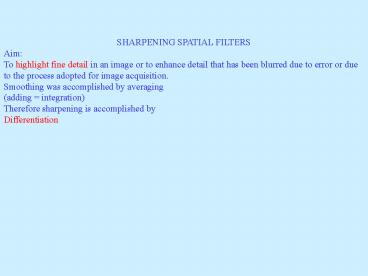SHARPENING SPATIAL FILTERS - PowerPoint PPT Presentation
1 / 11
Title:
SHARPENING SPATIAL FILTERS
Description:
UNSHARP MASKING AND HIGH-BOOST FILTERING. A blurred (averaged) version of an image is subtracted from the image itself in unsharp masking ... – PowerPoint PPT presentation
Number of Views:2097
Avg rating:3.0/5.0
Title: SHARPENING SPATIAL FILTERS
1
SHARPENING SPATIAL FILTERS Aim To highlight
fine detail in an image or to enhance detail that
has been blurred due to error or due to the
process adopted for image acquisition. Smoothing
was accomplished by averaging (adding
integration) Therefore sharpening is accomplished
by Differentiation
2
Differentiation in the discrete domain
To obtain the second derivatives, let us look at
the Taylor series of a function
3
Similarly
For a digital image h 1 (smallest increment
possible along x or y), therefore adding these
two equations, we obtain
Higher derivatives are neglected in comparison to
the first two derivatives
4
Derivatives of an image
5
- Differences between the first and second
Derivatives - First derivative is non-zero along the entire
ramp, while the second derivative is non-zero
only at the onset and end of the ramp - For a point, response is much stronger for the
second than the first derivative. - For a step an edge gives rise to a double
response. This is used for edge detection. - Second derivative is better suited than the first
derivative for enhancing fine detail.
6
Use of second derivative for Image Enhancement
The Laplacian
Because the Laplacian is derivative operator, its
use highlights gray-level discontinuities in an
image and de-emphasizes regions with slowly
varying gray levels. Background features can be
recovered while still preserving the sharpening
effect of the Laplacian operation by simply
adding the original and Laplacian images.
7
If the center coefficient of the Laplacian mask
is negative If the center coefficient of the
Laplacian mask is positive
8
How does this improve contrast?
If a region has constant gray level throughout,
then g(x,y) f(x,y) Whereas, if there is an
isolated bright pixel at the center of the mask,
it will become more prominent.
9
Application of Laplacian
10
Use of Composite Laplacian Mask
11
UNSHARP MASKING AND HIGH-BOOST FILTERING
A blurred (averaged) version of an image is
subtracted from the image itself in unsharp
masking
A generalization of unsharp masking is high-boost
filtering in which Agt1































